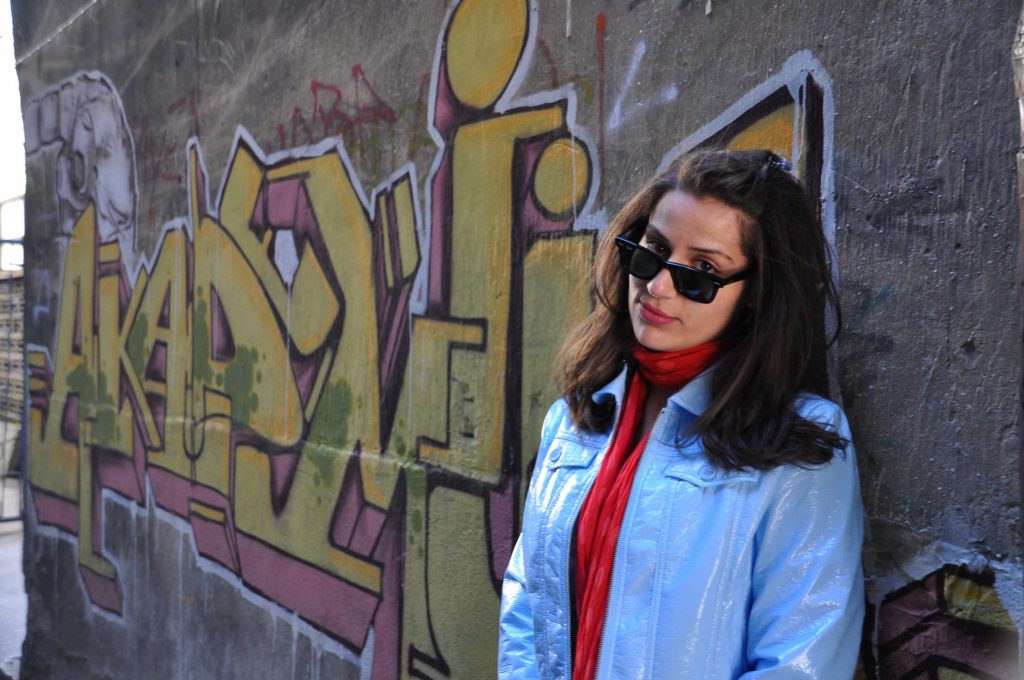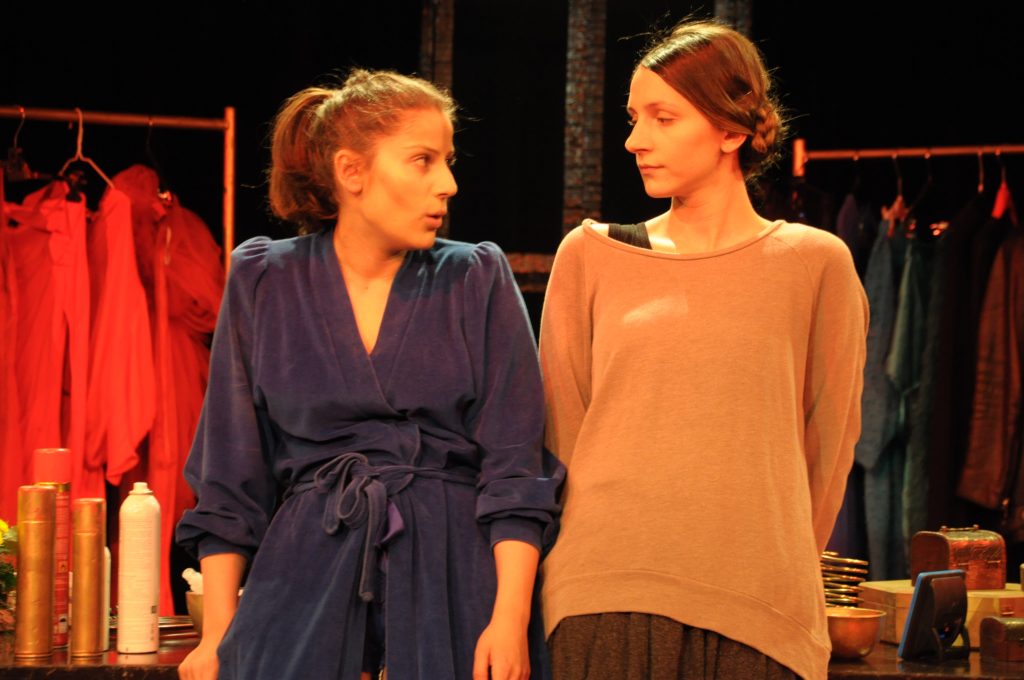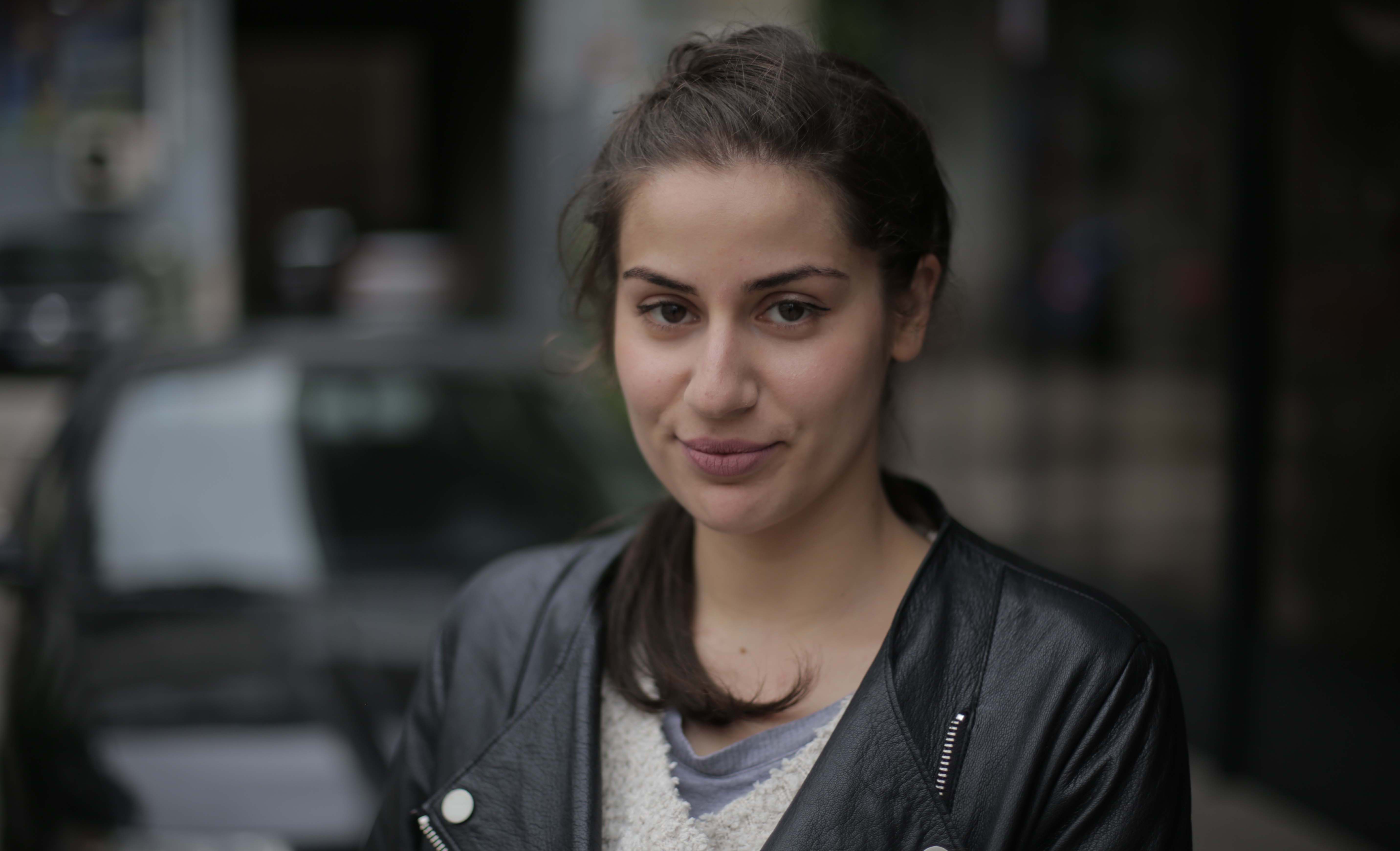Actress Elma Juković talks about the theatre world in Sarajevo, the lack of good female roles and why two men kissing on stage is still a big deal in Bosnia.
„The director will kill me. I don’t know my lines yet.” Elma Juković is sitting at Barhana restaurant in Sarajevo’s old bazar and switches between finishing her soup and preparing for her rehearsal. A few hours later she will know her lines and the rehearsal for „The Wizard of Oz“ at the Youth Theatre will turn out well. The 28-year-old is one of Bosnia’s most promising actresses and a child of the post-war generation. Spending most of her childhood in Germany during the war, she has played at all the big theatres in Sarajevo over the last couple of years. Between soup and desert she talks about how it was to come back to Sarajevo at a young age, the lack of good female roles and why two men kissing on stage is still a big deal in Bosnia.
You have worked as an actress for almost ten years now. What have you learned about yourself during this time?
A lot. Some people say that it is not easy to work with me and I complain often. But in order to act well I need to recreate my rolls in my own life. For example in my graduation play „The Maids“ by Jean Genet I am one of the two maids. I felt like that when I was younger; like someone who had to prove herself. My parents could not afford to send me on vacation. I could not tell it my friends because I would feel like I am not good enough. Just like my character in the play. That feeling stuck and I was able to deal with it through theater. I think that is one of the reasons why „The Maids“, which I chose for my graduation exam, has been very successful.
VIDEO: “During the war the theater was a shelter”
Do you try to recreate every roll in your own life?
Yes, in the beginning at least. For „The Maids“ I worked in a bar to feel how it is to be a servant for other people. For another roll I did not talk to my parents for two months because I needed to create a certain atmosphere.
That sounds very exhausting.
Yes, it is. Over the last years I have learnt that I can’t do that for every roll. At the same time, not every roll deserves a personal involvement like this. You got to find a middle ground: to draw form my own experiences, personal life and imagination.
How did you get interested in theater? Through your experiences or imagination?
Both. During the war I was in Germany and to come back to Sarajevo was a shock. To realize that my new life will be here, in a destroyed city, was not easy. I became introverted and started to write poems. Sad poems. I was an only child and my parents did not have much time for me. I spent a lot of time on my own, watched TV and started to imitate characters from TV shows. Already at a young age I was good at memorizing lines and poems. In high school I became part of the school’s theater group. That’s how it started. The final step was the Academy of Performing Arts in Sarajevo.

Did you have doubts when you were younger?
I underestimated how hard it can be and how much work you have to put into it. For my first roll in high school for example I did not show up to one of the rehearsals. I was 16 years old and a friend of mine asked me if I wanted to go for a beer with her. I said yes and told the director that I was sick. At the next rehearsal he told me that I had been replaced because I lack commitment. That was a lesson to really take it seriously and to work hard. That director had a huge influence on me and became a mentor.
When I am not playing for weeks I start to feel empty.
What is still hard today?
Actors can be very lonely people. Even though you might think the opposite. You are supposed to give a lot and that makes your soul burn out from time to time. Sometimes you have a bad day or feel sad or something unpleasant happened in your life. But you still have to get on stage and play like everything is fine. Because the audience paid for it and is expecting a good show. They are not interested in how you are feeling today. That is difficult sometimes because actors are people with moods just like everybody else.
Sometimes you get close to breaking and you have to be tough. You have to believe in yourself. But it gets easier with more experience. When I am not playing for weeks I start to feel empty. Because I would like to give something and express myself but there is no opportunity to do so. On the other hand, when I am totally in my character and play well, I forget everything and feel very happy. That is a wonderful feeling.

Is there any particular role you would like to play in the future?
I would like to play the woman in „The Goat, or Who is Sylvia?“ by Edward Albee again. It is about a married couple and their son. The husband falls in love with a goat and the characters slide into a crisis. The characters are fantastic, the dialogues are great. There are no clichés in the play and the audience doesn’t know what to expect. We played it at the Academy and in 2014 a few times at Kamerni Theatre but the audience did not respond well. A few women even complained and left. Father and son kiss each other. The husband cheats on his wife with a goat. The audience was not ready yet for such an unconventional play by young actors. It would be great to play it again under different conditions.
Are there good roles for women in Sarajevo?
Not many. Sarajevo and Bosnia are still quite conservative. The role of religion is not helpful either. Female characters are often portrayed as clichés. I have the impression that many men don’t really know how to engage with women on an equal level. I have found my place in the local theater world but there are only a few good female roles. And there are hardly any lead roles for women – especially for TV productions. Great female rolls exist, but there is lack of courage to put a woman in the focus.
Do you have a favorite theater in Sarajevo?
I like all of them. I like the intimacy at Kamerni, the spacious atmosphere at the National Theater, the Youth Theater because of the work with young people, and SARTR because of its history and place in the city. I feel different in each one of them. That is the challenging but also pleasant part of my work.
Kamerni Theater, the Youth Theater and the National Theater are almost next to each other.
The city: Sarajevo
During the 1980s the city known for its religious and cultural diversity experienced a decade filled with exciting sporting events, flourishing art scenes and a vibrant urban life. But the war brought this development to an abrupt end only a few years later. During the siege of the city, 11,541 people lost their lives, including over 1,500 children. An additional 56,000 people were wounded. Today, the capital of Bosnia and Herzegowina is slowly recovering and has a population of about 275,000.
The country: Bosnia and Herzegovina
The country declared independence from Yugoslavia on March 3, 1992. The following war killed more than 100,000 people and was ended with the Dayton agreement on December 14, 1995. Since then economic and political progress has been slow. Since the end of the war approximately 150,000 young Bosnians have left the country, and around 10,000 young people still leave the country each year.
In 2016 the unemployment rate was about 25 percent. Youth unemployment was even higher than 65 percent. Bosnia has a population of approximately 3,5 million people with an average salary of around 400 Euro. The political system of the country, which is based on ethnic identity since the war, is considered to be one of the world’s most complicated systems of government.

Great article.
thx, Jack!